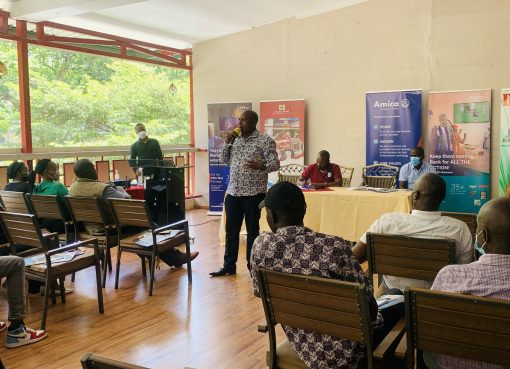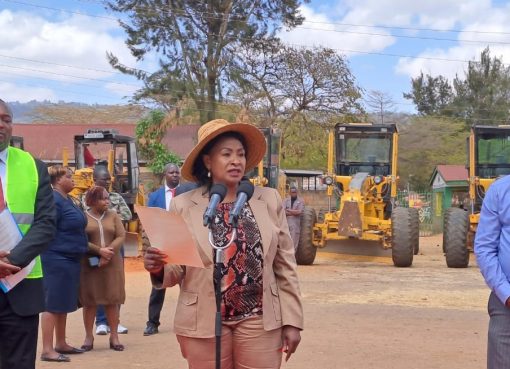Less than four years ago, Lucy Wanjiru, a resident of Kamurugu village in Kinamba area, Naivasha Sub-County, used to relieve herself in the open. The parcel of land that she had converted to a toilet is adjacent to her home.
“I used to defecate in the bush,” she recalls. “I would open my gate and get into the bush,” she continues. But she would be cautious so as not to arouse any suspicion.
She would not have wished it to be known that she goes to the open-air toilet. “I would bend to create the impression that I was fetching firewood,” she says. “Nobody would have suspected what I was up to.”
Twigs snapped from the shrubbery in the bush would come in handy for her in concealing her stools. This was a daily occurrence.
There were some consequences meted to her for not owning a latrine. “I would frequently fall ill without understanding why,” she reveals. “I often suffered from diarrhea,” she laments.
Those dark days are now behind her. Thanks to the Kenya Sanitation and Hygiene Improvement Programme (K-SHIP), which has been running since 2014 and is set, to wind up in 2019. Wanjiru now has a pit latrine in her compound.
A tippy tap—a pierced jerry can of water—tethered to a plank of wood serves to dispense running water for hand washing using soap. This curbs contamination more than blocking a jerry can’s nozzle with a nail that has to be removed and returned by hand.
By having a pit latrine with a pit cover, Wanjiru has immensely cut down on the flies that endlessly kept hovering in and around her home. Disease-transmitting germs picked by the flies upon landing on human waste would not be easily conveyed to her family’s food.
Wanjiru’s latrine is fixed with a rope to aid raise her after relieving herself. This support has been of great help to her since a cow gored her recently and injured her right leg. For several days, she has been limping. Heaving herself upright without the rope would be a more painful experience.
Kamurugu village falls under Biashara Ward, which has been certified as Open Defecation Free (ODF). “I realized that lack of a latrine was the main cause of my illnesses,” Wanjiru said. The foul smell that once hung in the air around her home is now gone. She had become so used to the odour that it appeared normal to her.
The Nakuru County Water, Sanitation and Hygiene (WASH) Coordinator, Caroline Vata, says the approach taken in having villages declared ODF is the Community Led Total Sanitation (CLTS). This seeks to ensure total behavior change within the villages and at household level.
The K-SHIP project officer working for the Centre for Behaviour Change and Communication (CBCC-Africa) in Naivasha, Gladys Abuta says one of the programme’s goals “was to reach and sensitize people with sanitation and hygiene messages, move people from open defecation to basic latrines and move those with basic latrines to improved sanitation.”
Stephen Njuguna is a quarry worker in Rui. “We didn’t have latrines in this quarry,” he recounts. Workers would come in the morning and leave at dusk. Whenever nature came calling, there was no option save to squat in the open. Human waste dotted the bushes within the quarry.
Those days are gone too. Four pit latrines now stand within the quarry shared by almost 30 workers who come in daily to mine rocks. Njuguna is optimistic that as the quarry expands, more toilets will spring up as well.
Mary Wangari is relieved. “Workers used to suffer from typhoid, diarrhea and vomiting,” she remembers. This was because workers kept descending to the banks of the river that flows through the quarry, to answer calls of nature. “We’d use the same water to prepare our meals,” she reveals. “We’d also drink it.”
Vata explains that putting up latrines in the quarry was a long process. Initially, the quarry landlords did not care about upholding hygiene standards. With time, public health officials and other partner organizations managed to persuade the quarry owners and the workers to accept that latrines are paramount for the health of all.
The workers here have been sensitized to cover the pits and to wash their hands under running water dispensed by a tippy tap after lathering with soap. This is the behaviour change that has been desired.
Besides, K-SHIP was to identify and provide access to vulnerable people to cover equity and inclusion.
The ravages brought about by aging greatly hamper elderly citizen’s ability to use ordinary pit latrines. Squatting is a nightmare for most of them. The Nakuru County WASH Coordinator, Vata, notes, “There were villages that took time to be defecation free and when we engaged with the communities, we realized that we have vulnerable groups within those villages.”
The elderly are included among the vulnerable. Others are the sick, the disabled and children.
Benard Mbugua and Esther Wanjiru are in their eighties. Public Health Officer in charge of Biashara Ward, Peter Kamau, recalls regarding this elderly couple, “When we first came here, they had sanitary facilities but they couldn’t use them properly since they couldn’t squat in the normal way.”
“Previously, we had difficulties with our toilet,” Wanjiru agrees. Their latrine had to be modified.
Their artisan son designed a commode for them. The base of a plastic bucket was cut off. The bucket was placed around the pit and then reinforced with concrete. This elderly couple now sits on the bowl.
A tippy tap is on hand for hand washing with soap. In Kamurugu village, CLTS yielded five homes of the elderly that required various forms of commodes.
A hurdy rope is fastened onto a firm plunk of timber in their latrines to aid them in rising.
Out of the 187 villages in Naivasha, “182 have been certified as ODF,” Vata says. “The balance of five is at a stage of follow up and maybe in two months time we will be declaring Naivasha ODF,” she hopes.
Pit latrines tend to be temporary. Vata’s concern is, “They get dilapidated and may collapse.” The CLTS is to ensure that they are well maintained.
A pertinent CLTS goal is to ensure reduction of diarrheal diseases in the implementation areas—Bahati, Olkaria, Maiela, Maai Mahiu, Hells Gate and Naivasha East. “From 2013 up to November 2019, we have seen diarrhea diseases reduce by 36 per cent in the 6 wards,” Vata says.
K-SHIP is funded by Water Supply and Sanitation Collaborative Council (WSSCC) through Global Sanitation Fund (GSF) and is being implemented in 11 counties, with AMREF Africa as the executing agency.
By William Inganga



